- Home
- Lisa Wingate
Word Gets Around
Word Gets Around Read online
Word Gets Around
Books by Lisa Wingate
DAILY, TEXAS
Talk of the Town
Word Gets Around
TENDING ROSES
Tending Roses
Good Hope Road
The Language of Sycamores
Drenched in Light
A Thousand Voices
BLUE SKY HILL
A Month of Summer
The Summer Kitchen
Word Gets Around
Copyright © 2009
Wingate Media, LLC
Cover design by The DesignWorks Group, David Uttley
Cover photograph by Steve Gardner, PixelWorks Studios, Inc.
Scripture quotations are from the King James Version of the Bible.
All rights reserved. No part of this publication may be reproduced, stored in a retrieval system, or transmitted in any form or by any means—electronic, mechanical, photocopying, recording, or otherwise—without the prior written permission of the publisher. The only exception is brief quotations in printed reviews.
Published by Bethany House Publishers
11400 Hampshire Avenue South
Bloomington, Minnesota 55438
Bethany House Publishers is a division of
Baker Publishing Group, Grand Rapids, Michigan.
Printed in the United States of America
* * *
Library of Congress Cataloging-in-Publication Data
Wingate, Lisa.
Word gets around / Lisa Wingate.
p. cm.
ISBN 978-0-7642-0491-3 (pbk.)
1. Horse trainers—Fiction. 2. Texas—Fiction. I. Title.
PS3573.I53165W67 2009
813'.54—dc22
2008044285
* * *
For my two small-town boys
who know that moms (and writers) need quiet time,
and that trips to town to deliver forgotten ball gloves,
left-behind track shoes, lost band instruments,
and trash bags full of sweaty football pads
are a great way to get it.
Thanks for looking after my peace of mind,
and for making every day an adventure.
What a blessing!
CONTENTS
Acknowledgments
Chapter 1
Chapter 2
Chapter 3
Chapter 4
Chapter 5
Chapter 6
Chapter 7
Chapter 8
Chapter 9
Chapter 10
Chapter 11
Chapter 12
Chapter 13
Chapter 14
Chapter 15
Chapter 16
Chapter 17
Chapter 18
Chapter 19
Chapter 20
Chapter 21
Chapter 22
Chapter 23
Discussion Questions
Acknowledgments
In considering this second visit to Daily, Texas, I’d be a pretty poor neighbor if I didn’t thank all the people who made the first visit such a hoot. To all the readers who became honorary Dailyians last year when Talk of the Town hit the shelves, thank you for taking time to send notes, e-mails, cards, letters, Texisms, historical snippets, book club reviews, and little stories that might be useful for the installment. Your companionship on these journeys completes the circle of blessing in ways that are truly amazing. Because of you, the population of Daily is growing by leaps and bounds, the stories keep flowing, and Imagene and the girls are up to their elbows in small-town mischief again. I can’t wait for you to drop on in and see what’s happening now!
I’d also like to thank a few “hometown” friends who’ve helped with technical details and other research for Word Gets Around. First of all, thanks to A-number-1 coach, Bennett Fields, for sharing the Bigfoot story in the teachers’ lounge, and for letting the folks of Daily borrow your mysterious creature for a bit. In some cases, truth is even more fun than fiction. Thanks to film producer and screenwriter, and generally sweet and funny person, Cynthia Riddle, for introducing me to the world of moviemaking, and for hanging on the phone through endless silly questions. Thanks to Sharon Mannion for proofreading, Janice and Lawrence Wingate for helping with books and feeding wandering Wingate boys, Teresa Lohman for helping with online scrapbooking, and Ed Stevens for getting me going on Youtube and for being the world’s best encourager. How in the world did I ever get so lucky as to have all of you?
Lastly, I’d like to thank the folks who do all the hard work that turns ideas into books. Thank you to my agent, Claudia Cross at Sterling Lord Literistic. A special measure of gratitude goes out to the amazing folks at Bethany House Publishers, who make this process such an incredible joy. In particular, thanks to Dave Long for always giving invaluable input and support, to Julie Klassen for astute (and fun—who would have thought?) line edits and suggestions, and to the amazing crew in marketing and publicity, who bring the books to the hands of readers with enthusiasm, innovation, and tender loving care—Steve Oates, Jim Hart, Brett Benson, Debra Larsen, Carra Carr, and Noelle Buss. Thanks for welcoming me and my crazy cast of imaginary friends into the BHP family!
Word Gets Around
Chapter 1
Lauren Eldridge
They say you can’t go home again, but the truth is, if you’re a small-town Texas girl, you can never really leave. The town travels with you like an extra layer of skin—something flamboyant and tight fitting. Even though you may hide it beneath the trappings of sophistication, it’s right there under your clothes, your secret identity. Whether you admit it or not, you have an affinity for big hair, shirts with pearl snaps, cowboy boots, and faded blue jeans. Even in the most upscale restaurants, you secretly search the menu for comfort foods like chicken-fried steak and catfish, especially on Fridays. Any Texas girl knows it’s not Friday without all-you-can-eat catfish.
The world would be better off if everyone ate fried food at least one night a week, and drank coffee you could cut with a knife, and lingered with their neighbors. We’d understand each other a little better, and maybe we’d understand ourselves. Perhaps we’d ponder, over the plastic basket with the grease-stained tissue paper, the need to run so far, so fast—to have, to do, to achieve, to gain, to win—to be all that and make sure everybody knows it. A pecan pie does not toil, nor does it spin, but it sure tastes good, and it makes a fine conversation piece.
In the right setting, you can talk for twenty minutes about the merits of a good pecan pie. You can discuss the pecans—paper shell, Stuart, native, chopped, broken, whole. You can talk about the fact that farm-fresh eggs make a better pie than store-bought. You can theorize as to why that might be. One thing that’s wrong with society today—too many chemically altered chickens living in giant egg factories, toiling mindlessly, uninspired by their work.
There’s a whole world out there that doesn’t know one egg from another, and for some reason, that world had always held an attraction for me. My limited contact with the strange and wondrous realms outside our little town of Daily, Texas, was the subject of my earliest childhood fascinations. That world seemed like the place to be, even when I was too young to understand it.
In the farthest reaches of my memory, there are hippies. They’re sitting on a street corner in Los Angeles, shaking tambourines, playing guitars, railing against nukes and advocating love. It’s a nice song, I think, and I’m enthralled by their swinging leather fringes, and the fact that they’re dancing half-naked on the sidewalk. We don’t see things like that back home in Daily, Texas.
Aunt Donetta grabs my hand and drags me across the street and we go find my father, who is delivering a herd of our ranch horses to th
eir winter jobs at a movie studio. The horses have been ferrying city kids and troops of Girl Scouts out at Boggy Bend Park all summer, so they’re dog gentle, says my father as he and the studio wrangler, Willie Wardlaw, watch the herd exit the trailer and blink in the bright California sunlight. The wrangler, my dad’s old rodeo buddy, laughs. “Just because Girl Scouts can handle them horses don’t mean movie actors can,” he says.
Standing there in my new pink cowgirl suit, proudly wearing my latest goat slapping championship belt buckle, I catalog that information in my six-year-old brain. Movie actors are worse horse riders than Girl Scouts. Even at six years old, I have suspected as much from watching TV westerns, but my theory is confirmed when Willie grins and says, “You know they only ride for the camera. Other than that, not a one of ’em knows the head from the hind end.”
Then Willie walks away with his clipboard, leaving me to fret about abandoning our remuda in movie land. I’ve been worried about this all along, because the horses are my personal friends and favorite playmates, except in the summer, when the campground at Boggy Bend fills with yammering city kids who are fun to play kickball with, but painfully ignorant about horses.
I cling to my father’s assurance that he has a sweet deal worked out to lease our horses for the winter, then bring them back to Daily in time for summer campers. He cannot believe the amount a movie studio is willing to pay for this. It’s well worth the long haul from Texas in the rebuilt Ford pickup he has lovingly pieced together from spare parts.
Aunt Donetta isn’t worried about the paycheck or the horses, but she does have something on her mind. She tells my father about the dangerous hippies in the street. They’re everywhere—singing, carrying anti-government signs, smoking and being s-e-x-u-a-l (she spells this word then blushes) in public. Los Angeles is one big, full-scale hippie convention. “It’s hardly a proper place for an impressionable child,” she says and frowns because, thanks to my father’s part-time rodeo affliction, my brother, Kemp, and I are often in improper places. We love those places, but Aunt Donetta feels the need to protect us, being as we have no mother to do it. She demands that my father take us home to Texas immediately. No—she does not want to see Hollywood Boulevard or Grauman’s Chinese Theatre.
Our trip to California is ruined. Daddy and Aunt Donetta pack my little brother and me into the truck and we head home, and I never go back to California again, even though my dad helps support his rodeo habit for years by supplying Willie Wardlaw with movie horses. In fact, our existence is all about horses. My father is certain that, since Kemp’s only interest is sports, I’ll be the one to take over the ranch, eventually.
The day I gave up horses for a graduate teaching assistantship at Kansas State University and left Daily, Texas, for good became the biggest disappointment of my father’s life. At twenty-nine, I needed a clean break from the hometown, and even though my father knew the reasons, my leaving was hard for him to accept. For two years afterward, he pretended he didn’t have a clue what I was doing, way up north in Kansas.
When he finally managed to navigate the university phone system and call my office, I knew something big was up.
“Hey-uh, Puggy, what ya doin’?” My father has forever insisted on calling me Puggy, despite the implied unattractiveness of it. In my family, you’re saddled with a nickname the minute enough relatives make it to the hospital to establish a quorum. After that, you’re stuck with it. My name is Lauren, but to my dad, I am forever Puggy.
“Eating a breakfast taco and grading anatomy finals,” I replied. “It’s always entertaining. I wonder if some of these kids ever come to class. If they did, they’d know that a fracture of the first phalanx in a racing greyhound would be in the foot, not the mouth. We tried offering an anatomy course in summer minimester this year, but it’s looking like it was a mistake.”
“I read where kids startin’ college are even dumber than we used to be.” Dad seemed surprisingly willing to talk about campus life. This was a first. Normally when I brought it up, he changed the subject. “Them SAT scores are down three percentile points overall. Read it in the Wall Street Journal.”
The Wall Street Journal? My dad? “Well, it’s a good thing the Wall Street Journal is not here grading these tests, because this kid has the jawbone connected to the leg bone.”
Dad hooted as though I’d said something hilarious. “Woohwee, that’d be interesting, now wouldn’t it? Don’t reckon that dog’d hunt. I took anatomy once. Don’t remember much. Think that mighta been the year I broke my shoulder.” It was a well-known fact that my father’s undergraduate career involved more college rodeo than actual coursework. When he broke his shoulder and couldn’t continue to compete, he quit school, went home to Daily to work in my grandfather’s auto shop, and never returned to academic life. According to him, it was probably for the best.
“So, how’s the teachin’ business?”
“It’s fine, Dad. It’s good. I’m a little behind in getting some things graded. I’ll catch up now that the minimester course is over.” Ah, heaven—the lazy hours of midsummer, when the campus was quiet and the student population reduced by half.
“Got a lot to do this weekend?”
“A bit, but I’ll get it finished. We’re off tomorrow, so it’s a long weekend for us, and I’m not teaching anything else this summer, which means I don’t have to prep until closer to fall.” Something began to needle the back of my mind. These were strange questions, coming from my father. Dad didn’t like to talk on the phone. When he did call, we conversed about ranch business, or the latest happenings in Daily, or how my brother, Kemp, was doing now that he’d moved home and taken a coaching job at Daily High. “What’s up, Dad?”
“Well, nothin’, nothin’ … ” His pregnant pause shifted my attention from the anatomy test to the conversation.
“Dad, is something wrong?”
“Well, no. No, a’course not.” He diverted the dialogue with a short dissertation about a local girl having made it big in a TVshow talent competition a few months ago. Amber Anderson’s second-place finish on American Megastar last April was the biggest thing to hit Daily, Texas, in years. Aunt Donetta made sure I tuned in for the big Hometown Reveal segment, when Amber was announced as a finalist. It was strange, seeing Daily on the screen—all the familiar places, all the same people. The town seemed to have remained frozen in time during the two years I’d been away. Watching Amber’s hometown show, I basked in the transient warmth of memories. And then, during a scene at the rodeo arena, completely without warning, there was a big roan horse with a Hash-3 brand on its hip. I remembered the day the horse was born. I remembered Danny and me helping it into the world. I remembered when the Hash-3 was the two of us—young, married, living in a crumbling ranch house on the back side of my father’s place, with a mile-high stack of impractical dreams.
The history of that life, and its abrupt and painful ending, had flashed through my mind, and I couldn’t breathe. My body felt heavy and numb. I turned off the TV, walked to the bedroom, crawled into bed, and cried until I fell asleep. The next day, I called in sick and let another GA teach my classes. I was careful not to turn on week two of the American Megastar finals. …
Dad’s voice brought me back to the present. “So, anyhow. You’ll never guess who’s here. Ol’ Willie Wardlaw. You remember him? You met him when you was just little. Remember? The year you and Aunt Netta rode along to deliver the horses at the movie studio?”
Ah, the infamous year of the hippies. “Sure, of course I remember.” My one and only Hollywood experience, when I didn’t get to meet either Mickey Mouse or the cast of Little House on the Prairie—my two fantasies at the time. “Wow, that’s something. I didn’t know you two kept in touch anymore.”
“Well, we hadn’t talked in a while. Few years. Boy, between the movie business and race horses, Willie’s kept busy. All that time when we was bringin’ him our park horses, he was charging the studio four times the lease fee he paid us per anim
al. Old scoundrel. And here I thought we was gettin’ rich. You should see the pictures of this place he runs out in California. It’s like the Tash-mer-hall for horses—thirty-stall barn, all the pastures mowed like golf course lawns, exercise track with a startin’ gate, white fence runnin’ as far as the eye can see. Got an indoor workout arena, too. Air-conditioned. I mean, Willie’s got hisself a horseman’s heaven.”
Well, that’s it. Dad’s moving to California to train racehorses with Willie. He’s trying to break it to me gently. “It sounds wonderful, Dad. I’m glad you and Willie are having a good visit. What’s he doing in Texas, anyway?” In Daily, of all places.
My father went right on talking. “Yeah, old Willie’s done good. Stands some big time runnin’ horses at stud, right there on the place. Got three hot walkers, and a full-size arena out back. Keeps horses for some movie stars, too. Lord a’mercy, these pictures got girls ridin’ in bikini bathing suits. Willie’s got him a cute little girlfriend, too. She’s upstairs gettin’ ready to go to breakfast at the cafe. Wooh-wee, Daily ain’t ever seen anything like her, I’ll tell you. She dresses like that Pamela Hilton.”
“Paris Hilton?”
“Yeah, her.”
Dad has fallen for Willie’s Malibu Barbie girlfriend. He’s headed to California to find one of his own. That’s why it’s him calling, not Aunt Donetta. She’s too mad to talk. “Well, now there’s a picture.” Paris Hilton on the streets of Daily. Look out. “Has Aunt Donetta seen her yet?”
“Oh, you bet. This afternoon, Aunt Netta’s gonna take her down to Boggy Bend to get some sun at the RV park pool.”
Aunt Donetta is hanging out with Willie’s bikini-babe girlfriend. At the Boggy Bend RV park. Wonder if Paris knows that, by swimming pool, they mean a hollowed-out section of the creek with bluegill, perch, and an occasional diamondback water snake living in it. The first time a fish nips her toes, she’ll freak. “That’s nice.”

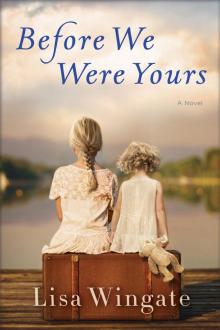 Before We Were Yours
Before We Were Yours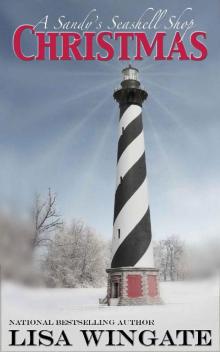 A Sandy’s Seashell Shop Christmas
A Sandy’s Seashell Shop Christmas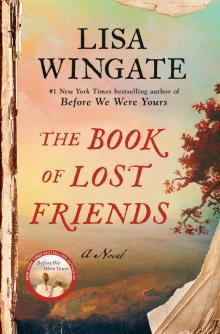 The Book of Lost Friends
The Book of Lost Friends Larkspur Cove
Larkspur Cove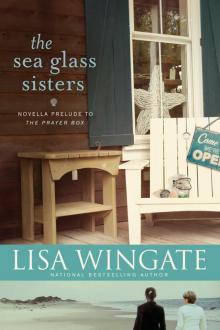 The Sea Glass Sisters
The Sea Glass Sisters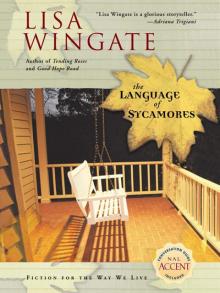 The Language of Sycamores
The Language of Sycamores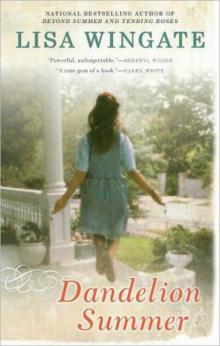 Dandelion Summer
Dandelion Summer Word Gets Around
Word Gets Around Beyond Summer
Beyond Summer Firefly Island
Firefly Island The Tidewater Sisters: Postlude to The Prayer Box
The Tidewater Sisters: Postlude to The Prayer Box Talk of the Town
Talk of the Town![Blue Sky Hill [01] A Month of Summer Read online](http://i1.bookreadfree.com/i1/03/29/blue_sky_hill_01_a_month_of_summer_preview.jpg) Blue Sky Hill [01] A Month of Summer
Blue Sky Hill [01] A Month of Summer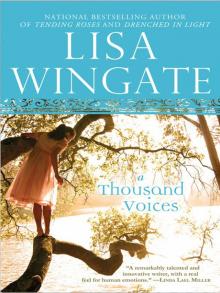 A Thousand Voices
A Thousand Voices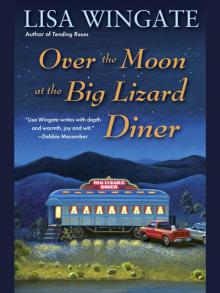 Over the Moon at the Big Lizard Diner
Over the Moon at the Big Lizard Diner Never Say Never
Never Say Never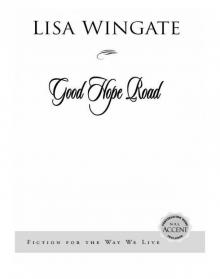 Good Hope Road
Good Hope Road The Summer Kitchen
The Summer Kitchen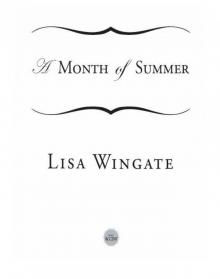 A Month of Summer
A Month of Summer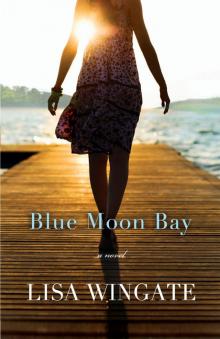 Blue Moon Bay
Blue Moon Bay Drenched in Light
Drenched in Light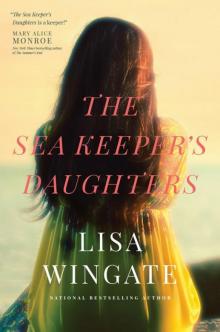 The Sea Keeper's Daughters
The Sea Keeper's Daughters